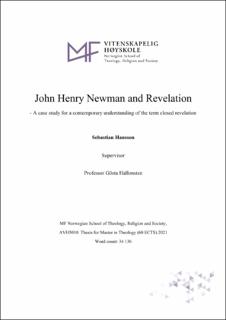John Henry Newman and Revelation : a case study for a contemporary understanding of the term closed revelation
Master thesis
Permanent lenke
https://hdl.handle.net/11250/2734545Utgivelsesdato
2021Metadata
Vis full innførselSamlinger
Sammendrag
The primary aim of this thesis is to evaluate the legitimacy of the criticism directed against John Henry Newman (1801-1890) regarding a continuing revelation. The secondary aim is to create a contemporary understanding of what a closed revelation in fact entails. The thesis fulfils these aims by answering the research questions regarding the components of Newman’s theology and philosophy for understanding his view on revelation and the development of doctrine. Thereafter, the thesis investigates the arguments for and against Newman representing a doctrine of a continuing revelation as presented by various theologians in order to answer whether the criticism is justified. The final part of the thesis analyses what a contemporary understanding of a closed revelation signifies. The results of this thesis are that the criticism against Newman is not justified. The criticism is strongly based on an instruction-theoretical view of revelation which does not sufficiently accommodate Newman’s philosophical thought. A deeper understanding of the nature of revelation provides tools for understanding the criticism and its prerequisites. By studying the criticism directed at Newman and why it is not a justified case, the main body of the thesis constitutes a case study for a contemporary understanding of the terminology closed revelation. The most significant meaning of this concept is the normativity of Christ and his apostles, leading to the understanding that Christ represents the culmination of God’s self-revelation to mankind. Revelation is ultimately God’s act of self-disclosure, rather than the revealing of doctrinal truths.
